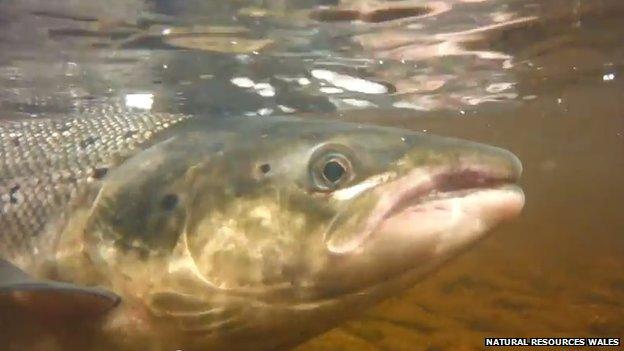Salmon stocking for Welsh rivers to stop from 2015
- Published

The Cynrig hatchery, near Brecon, will remain open while two others will shut at Dolgellau and Corwen
Salmon stocking is to be phased out on Welsh rivers from next year in a move aimed at boosting their numbers.
Natural Resources Wales (NRW) says scientific research shows hatchery-reared young salmon have a lower survival rate than young wild fish.
It also plans to close two of its hatcheries in Denbighshire and Gwynedd.
But the manager of a Carmarthenshire hatchery said the policy would put Welsh salmon numbers at risk and cut his business by 60%.
NRW said it looked at a wide range of scientific evidence from the UK and abroad which suggested there were more effective ways to support salmon in Welsh rivers.
It said salmon became extinct on the River Taff during the industrial revolution and stocking played a part in its recovery along with some other previously industrialised rivers.
However, NRW said a study now reveals that, after stocking provided that initial boost to restore a population, more salmon would be produced if fish were left in the river to spawn rather than taken for hatchery rearing.
But Viv Bradshaw, hatchery manager at Llyn y Fan, Llandeilo in Carmarthenshire, said: "The salmon stocks are in terrible decline at the moment.
NRW said building fish passes has helped open 1,500km of waterways to spawning grounds
"And this policy of non-stocking young salmon into our Welsh rivers is going to create further problems with our numbers."
Mr Bradshaw said: "As the years go by the numbers of [Welsh] salmon will decline and we'll end up with NRW telling all the anglers in Wales 'you must put every fish back in the river' - it will be mandatory catch and release."
'Vociferous critics'
He explained that such a policy was already in place on the River Wye where millions have been spent on the habitat.
Dr Stephen Marsh-Smith, director of The Wye and Usk Foundation, a charity which looks after the habitat, water quality and fisheries of the rivers Wye and Usk, said NRW's plan was "challenging what are some extremely entrenched beliefs" held by a minority of "vociferous critics".
"This time the new organisation has gone with the evidence and honoured the sustainable principles enshrined in their name," he said.
NRW said that over the last 10 years, work to improve fish stocks has included opening up 1,500km of access to spawning grounds by building fish passes and improving 500km of habitat.
Its at a meeting in Bangor, Gwynedd.
It will lead to the closure its hatcheries at Mawddach, near Dolgellau, and Maerdy near Corwen.
The Cynrig hatchery, near Brecon, will remain open and NRW may develop a freshwater research centre on the site.
NRW knowledge, strategy and planning director Ceri Davies said: "We recognise that there will be some debate around this decision, but scientific evidence shows that this is the best course of action to secure the future of wild salmon and angling in Wales."
- Published24 May 2014
- Published16 March 2014
- Published4 March 2014
- Published30 October 2013